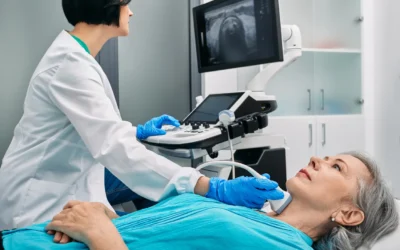Blog Post
Weight Management in Women
Weight changes are one of the most common and frustrating concerns women face, especially during midlife. Questions like does HRT help with weight loss, does HRT cause weight gain, or will I lose weight if I stop HRT come up frequently in clinical conversations. At...
Hormonal Imbalance Red Flags: When Should You See a Specialist?
Feeling anxious without a clear reason can be confusing and frustrating, especially when it seems to come and go with your cycle, stress levels, or life stage. Many people ask, can hormones cause anxiety or can hormone imbalance cause anxiety, and the answer is yes....
What Causes Women to Lose Hair During Perimenopause and Menopause?
Hair changes are one of the most distressing and unexpected symptoms many women experience during midlife. Perimenopause and thinning hair, increased shedding, and changes in texture often raise questions about hormones, aging, and treatment options. Menopause...
Thyroid Health: A Key to Energy and Metabolism
The thyroid gland plays a central role in how your body uses energy. When it functions properly, metabolism, weight regulation, temperature control, and overall energy levels stay balanced. When it does not, symptoms such as fatigue, weight changes, brain fog, and...
How to Cure PCOS Permanently?
Polycystic ovary syndrome (PCOS) is one of the most common hormonal conditions affecting women of reproductive age. Yet it is also one of the most misunderstood. Many people search for a permanent cure, but the reality is more nuanced. Understanding the different...
Change in Thyroid Nodule: Why You Should Know
Why Monitoring Thyroid Nodules Matters Thyroid nodules are extremely common, and most are harmless. Even so, changes in their size or appearance can carry important clinical meaning. That’s why endocrinologists emphasize routine monitoring, ultrasound follow-up, and...
Thyroid Cancer Metastasis Sites: What You Need to Know
Understanding Metastatic Thyroid Cancer Thyroid cancer is often considered highly treatable, especially in its early stages. However, there are cases where cancer cells spread beyond the thyroid. This spread, known as metastasis, can significantly change the way the...
Molecular Testing for Thyroid Cancer: What to Know
Why Molecular Testing Matters Thyroid cancer is one of the few cancers where early detection, lab evaluation, and risk-stratified management dramatically improve outcomes. Beyond imaging and biopsy, clinicians now use molecular testing, tumor markers, and highly...
Can a Benign Thyroid Nodule Become Malignant?
Understanding Thyroid Nodules Thyroid nodules are common findings—small lumps or growths that form within the thyroid gland. Most are harmless, but because they can occasionally become cancerous, proper evaluation is essential. Many patients ask: “Can a benign thyroid...
Understanding Tall Cell Variant of Papillary Thyroid Cancer
What Is Papillary Thyroid Cancer? Papillary thyroid cancer (PTC) is the most common type of thyroid malignancy, accounting for about 80% of all thyroid cancer cases. It develops from follicular cells in the thyroid gland and is usually slow-growing with an excellent...
Understanding an Enlarged Thyroid
What Does It Mean to Have an Enlarged Thyroid? The thyroid is a small, butterfly-shaped gland located at the base of your neck. It regulates metabolism, energy, and many essential body functions. When it becomes enlarged, the condition is known as a goiter. An...
Types of Thyroid Cancer: Understanding the Differences and Importance of Expert Care
How Fast Can a Thyroid Nodule Grow? Thyroid nodules are lumps that develop within the thyroid gland. Most are benign thyroid nodules, but some may require closer monitoring. Many patients wonder, “How fast do thyroid nodules grow?” or “Can benign thyroid nodules grow...
Thyroid Nodule Symptoms: Top Things to Know
Understanding Thyroid Nodules The thyroid is a small, butterfly-shaped gland in the neck that regulates metabolism, energy levels, and many essential body functions. Sometimes, small lumps, known as thyroid nodules, can form within the gland. Most nodules are benign,...
Treatment Options for Papillary Thyroid Carcinoma
Understanding Papillary Thyroid Carcinoma Papillary thyroid carcinoma (PTC) is the most common type of thyroid cancer, known for its slow growth and high cure rate. Still, it requires expert evaluation and precise treatment planning. At Park Avenue Endocrinology &...
Thyroid Cancer Treatment: Your Guide to the Best Options for a Cure
Can Thyroid Cancer Be Cured Completely? Thyroid cancer is one of the most treatable types of cancer, and in many cases, it can indeed be cured. The outlook is excellent when the disease is diagnosed early and treated appropriately. Patients often ask, “What is the...
Pediatric Thyroid Cancer: Why Choosing the Right Surgeon Matters More Than Ever
Why Pediatric Thyroid Cancer Requires Special Attention Thyroid cancer is relatively rare in children and adolescents compared to adults, but when it does occur, it often behaves differently. Pediatric thyroid cancer tends to spread earlier to lymph nodes, yet...
Thyroid Biopsy Results Explained: What Your Report Really Means
Why Ultrasound and Biopsy Go Hand in Hand When a thyroid nodule is discovered, two tests usually guide the diagnosis: ultrasound imaging and fine-needle aspiration biopsy (FNA). The ultrasound provides a picture of the gland—its size, structure, and any suspicious...
What Qualifies as a High Volume Thyroid Surgeon?
Why Surgeon Volume Matters in Thyroid Surgery When it comes to thyroid surgery, skill and experience go hand in hand. But beyond board certifications or years in practice, there’s another factor that significantly impacts patient outcomes: surgical volume. In other...



















